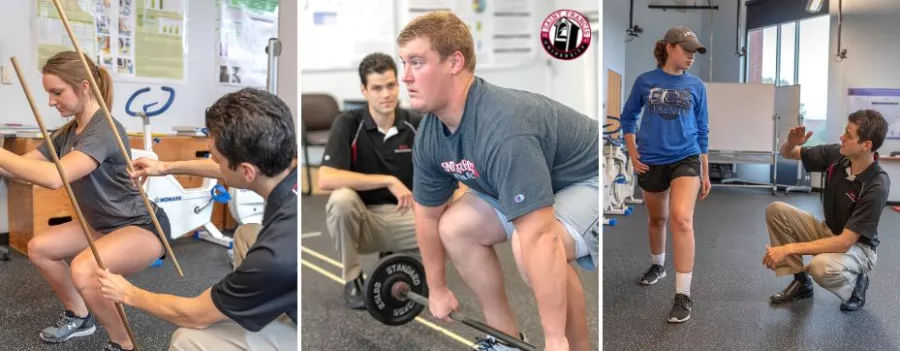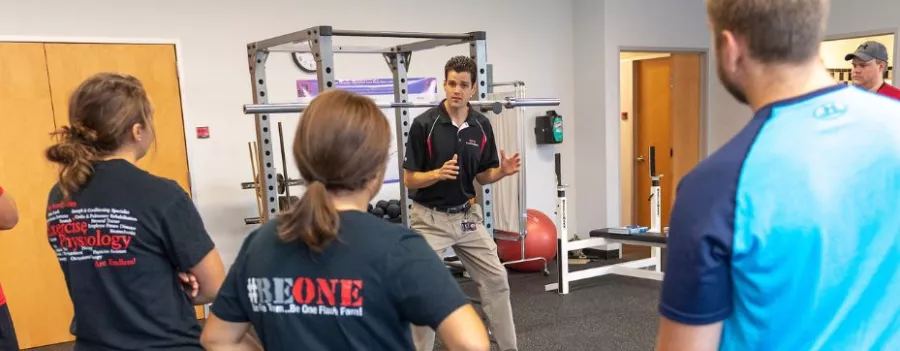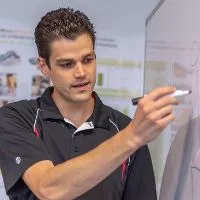
DiSepio Institute
Human Performance Lab
OVERVIEW
Put your health first in the Human Performance Lab at SFU.
Reach your fitness or athletic potential, reduce injury risk, or lower your risk for chronic diseases through comprehensive assessments and exercise plans.
Our Mission
To assess, evaluate, and disseminate knowledge of human performance as it relates to health, wellness, physical fitness, and athletic ability through education, research, and service.
Our Vision
The HPL is a teaching laboratory that provides assessments of health and physical fitness to the SFU community and residents of surrounding communities through proficient skills attained by Professionally Certified Exercise Physiology Faculty and undergraduate Exercise Physiology students.

GETTING STARTED
Interested? Here's a few things you need to know.
Scheduling your assessment(s):
Assessments are conducted by appointment only, and take place after completing the following online form:
Once we receive confirmation of completed forms we will contact you to schedule your appointment and notify you of the pretesting instructions to follow for the most accurate results.
If you are interested in an assessment or package that involves exercise, we will need to ask you questions about your health history.
The questions we will be asking are from the PAR-Q+ and can be found here: https://eparmedx.com. Based on your responses, you may need medical clearance from your Primary Care Physician (PCP) before participating in any assessments involving exercise. If this is required, you will be notified.
FACILITIES/EQUIPMENT
The only technology of its kind in the region, making it an unforgettable experience!
Body Composition (Bod Pod, InBody770)
Cardiovascular-Metabolic System
Anaerobic Testing Cycle Ergometer
Biodex Isokinetic Dynamometer
NeuroCom Dynamic Posturography Unit
DARI Motion Capture
Vicon Motion Capture
Kistler Force Plates
Muscle Sound Ultrasound

Equipment Functions
Body Composition (Bod Pod, InBody770): Devices used to determine what your body weight is made of (i.e., fat mass, lean body mass, muscle mass) and estimate resting energy expenditure.
Cardiopulmonary-Metabolic System: Analyzes the exercise capacity, energy expenditure, and risk of developing chronic disease.
Biodex Isokinetic Dynamometer: Evaluates strength in all major muscle groups of the body.
DARI Motion Capture: A new markerless motion analysis system that can assess athletic readiness to help prevent injuries. (Overview)
Muscle Sound Ultrasound: Provides a detailed look at the size and quality of your muscles.
ASSESSMENTS
We're here to help you understand your health.
Learn more about our assessments to determine which one is the best fit for you and your needs. View our Assessment Fee Chart for pricing information.
Body Composition (Bod Pod) or In Body
-
Determine the amount of water, fat, and lean tissue in your body. Testing your body composition evaluates your risk for disease, estimates your calorie intake to fit your desired target weight, all while determining safe and effective body weight goals.
-
Testing is completed in approximately 30 minutes total.
- Preparation: 5 minutes
- Testing: sitting in Bod Pod while wearing minimal tight fitting clothing for 2-3 trials, 30 seconds per trial
- Debriefing of information: up to 25 minutes
-
No. We can transport the Bod Pod or InBody 770 to your facility and offer testing for your employees, clients, or patients. Contact us today to receive a quote!
Determine the amount of water, fat, and lean tissue in your body. Testing your body composition evaluates your risk for disease, estimates your calorie intake to fit your desired target weight, all while determining safe and effective body weight goals.
Testing is completed in approximately 30 minutes total.
- Preparation: 5 minutes
- Testing: sitting in Bod Pod while wearing minimal tight fitting clothing for 2-3 trials, 30 seconds per trial
- Debriefing of information: up to 25 minutes
No. We can transport the Bod Pod or InBody 770 to your facility and offer testing for your employees, clients, or patients. Contact us today to receive a quote!
Metabolic Testing
-
Determine exactly how many calories your body burns at rest, how stable it is, and whether you primarily burn carbs or fats. This can help you achieve your personal goals, whether it’s to lose fat, gain muscle, or both. You will be given a detailed print out of your results that you can share with your doctor or endocrinologist!
-
Testing is completed in approximately 1 hour total.
- Preparation: 5 minutes
- Testing: approximately 20 minutes
- Debriefing of information: up to 30 minutes
-
Determine your Aerobic Threshold or Metabolic Efficiency (MetE). This helps set your "Zone 2" training zone, the intensity you should train at to help your body adapt to burning more fat and build an endurance base before starting higher intensity training.
You can also determine how much you should eat during a long duration event to maintain your pace. Your Anaerobic Threshold (also known as Lactate or Ventilatory Threshold), the minimum intensity you should train at to increase your overall fitness will be measured along with your VO2max. Your VO2max is the Gold standard for evaluating aerobic fitness level and your risk of developing chronic disease. *Higher Fitness = Less Risk
Testing is ideal for anyone who is interested in improving endurance race performance or reducing risk of chronic disease.
-
Testing is completed in approximately 1 hour total.
- Preparation: 10 minutes
- Testing: 10 - 30 minutes, but is solely dependent on your ability
- Debriefing of information: up to 30 minutes
Determine exactly how many calories your body burns at rest, how stable it is, and whether you primarily burn carbs or fats. This can help you achieve your personal goals, whether it’s to lose fat, gain muscle, or both. You will be given a detailed print out of your results that you can share with your doctor or endocrinologist!
Testing is completed in approximately 1 hour total.
- Preparation: 5 minutes
- Testing: approximately 20 minutes
- Debriefing of information: up to 30 minutes
Determine your Aerobic Threshold or Metabolic Efficiency (MetE). This helps set your "Zone 2" training zone, the intensity you should train at to help your body adapt to burning more fat and build an endurance base before starting higher intensity training.
You can also determine how much you should eat during a long duration event to maintain your pace. Your Anaerobic Threshold (also known as Lactate or Ventilatory Threshold), the minimum intensity you should train at to increase your overall fitness will be measured along with your VO2max. Your VO2max is the Gold standard for evaluating aerobic fitness level and your risk of developing chronic disease. *Higher Fitness = Less Risk
Testing is ideal for anyone who is interested in improving endurance race performance or reducing risk of chronic disease.
Testing is completed in approximately 1 hour total.
- Preparation: 10 minutes
- Testing: 10 - 30 minutes, but is solely dependent on your ability
- Debriefing of information: up to 30 minutes
Athletic Readiness / Return to Play
-
Most injuries in sports can be prevented with the proper functional ability and training program. Using the latest technology, we can assess your athletic readiness to design an individualized training plan to reduce injury risk and increase your athletic performance or ensure you are at minimal risk of re-injury when returning to play.
-
Testing includes:
- Body Composition (InBody770)
- DARI Motion Capture
- Biodex Knee Strength Assessment
Testing is completed in approximately 45 minutes total.
- Preparation: 5 minutes
- Testing: 30 minutes
- Debriefing: 25 minutes
Most injuries in sports can be prevented with the proper functional ability and training program. Using the latest technology, we can assess your athletic readiness to design an individualized training plan to reduce injury risk and increase your athletic performance or ensure you are at minimal risk of re-injury when returning to play.
Testing includes:
- Body Composition (InBody770)
- DARI Motion Capture
- Biodex Knee Strength Assessment
Testing is completed in approximately 45 minutes total.
- Preparation: 5 minutes
- Testing: 30 minutes
- Debriefing: 25 minutes
PACKAGES
Giving you the most detailed result possible.
Each package includes a combination of assessment tests to provide you with the most accurate information. View our Assessment Fee Chart for pricing information.
Personal Fitness Package
-
Testing includes:
- Body Composition (Bod Pod or InBody)
- Aerobic Fitness
- Functional Movement Screen
- Individualized Training Plan Based on Testing Results
Testing is completed in approximately 2 hours total.
- Preparation: 5 minutes
- Testing: 1.5 hours, but is solely dependent on your ability
- Debriefing of information: 25 minutes
Testing includes:
- Body Composition (Bod Pod or InBody)
- Aerobic Fitness
- Functional Movement Screen
- Individualized Training Plan Based on Testing Results
Testing is completed in approximately 2 hours total.
- Preparation: 5 minutes
- Testing: 1.5 hours, but is solely dependent on your ability
- Debriefing of information: 25 minutes
Weight Management Package
-
What determines our body weight comes down to what we put into our body (diet) and what we do with it (physical activity/exercise). This package is designed to help guide you on the right path towards your personal weight goal.
We will discuss the importance of understanding your body composition, rather than just looking at weight and how to improve it. We combine the science of how your body works with what simple things can you do in your lifestyle to achieve your personal goals!
Please see respective tabs above explaining each individual assessment.
-
Testing Includes:
- Body Composition (Bod Pod or inBody)
- Resting Metabolic Rate (RMR)
- Aerobic Fitness
- Individualized Plan Based on Testing Results
Testing is completed in approximately 2 hours total.
- Preparation: 5 minutes
- Testing: 1.5 hours, but is solely dependent on your ability
- Debriefing of information: 25 minutes
What determines our body weight comes down to what we put into our body (diet) and what we do with it (physical activity/exercise). This package is designed to help guide you on the right path towards your personal weight goal.
We will discuss the importance of understanding your body composition, rather than just looking at weight and how to improve it. We combine the science of how your body works with what simple things can you do in your lifestyle to achieve your personal goals!
Please see respective tabs above explaining each individual assessment.
Testing Includes:
- Body Composition (Bod Pod or inBody)
- Resting Metabolic Rate (RMR)
- Aerobic Fitness
- Individualized Plan Based on Testing Results
Testing is completed in approximately 2 hours total.
- Preparation: 5 minutes
- Testing: 1.5 hours, but is solely dependent on your ability
- Debriefing of information: 25 minutes
PROGRAMS
Reach your personal health and fitness goals.
Personalized Monthly Exercise Plan
Each assessment comes with a general exercise plan based on your individual results. This Add on to any assessment or package provides you with a weekly individualized aerobic, resistance and flexibility training plan to help you reach your personal fitness goals.

Supervised Exercise Training
Receive one-on-one personal training from the HPL staff in the DiSepio Institute for Rural Health & Wellness Fitness Center. Recommended for anyone who is looking to begin a new exercise program or just wants some help with how to use the machines correctly. Training requires a DiSepio Fitness Center membership (visit francis.edu/Fitness-Center for more pricing information).
F.L.A.S.H. Wellness Program
Forming Lifelong Adherence for Sustainable Health
Receive one-on-one counseling on lifestyle behavior changes including losing weight and reducing your risk of chronic diseases. You will meet (via phone or face-to-face) with HPL staff weekly for the first month, biweekly for months two to six, and once monthly thereafter who will help you adopt a healthier lifestyle to achieve your personal health goals.
CONTACT US
Assistant Director, HPL:
Kris Wisniewski, Ph.D., RCEP, CET, EIM, CSCS

Address:
DiSepio Institute for Rural Health and Wellness
108 Franciscan Way
Loretto, PA 15940
Email: HPL@francis.edu
Phone: 814-471-1132
FREQUENTLY ASKED QUESTIONS
Let SFU guide you to being your best self yet.
-
The HPL's services are relevant to anyone who wants to operate at their physical best, regardless of their age or vocation.
Examples of individuals who would benefit from these services include:
- Athletes who want to train more specifically to their sport and reach their full performance potential.
- Individuals preparing to begin a new fitness regimen or increase their workout intensity.
-
A detailed overview of your results including:
- What they mean for you personally
- An individualized prescription designed specifically for you to improve your results
-
We offer the most affordable pricing for these types of assessments in Pennsylvania. You can expect to pay 3 – 10 times more anywhere else for the same types of testing we offer. Please see the assessment fee chart for pricing.
Why is the cost so low compared to other locations?
- We want to serve the community and help as many as possible to live healthier and have a higher quality of life.
- We are a teaching laboratory and want to give our Exercise Physiology students more experience. This does not mean you will receive low quality service. You will be extremely satisfied with the amount of information you are provided about your results and how to improve!
-
We accept all major forms of payment! Please note that evening and Saturday testing is exact cash or check only.
Visit HPL Directions and Parking for more information.
-
We are a teaching laboratory. Therefore, all testing is conducted by upper level Exercise Physiology students from Saint Francis University and supervised by certified Exercise Physiology Faculty members.
Dr. Wisniewski is the Assistant Director of the Human Performance Laboratory and an Associate Professor of Exercise Physiology at Saint Francis University.
He earned his BS degree in Exercise Science from Slippery Rock University, and MS degree in Health, Physical Activity, and Chronic Disease, and a PhD in Exercise Physiology from the University of Pittsburgh. Dr. Wisniewski has over 15 years of experience specializing in using exercise as a form of medicine to prevent and treat various cardiovascular and metabolic diseases, and cancers. His expertise also encompasses helping athletes prevent injuries and achieve their performance potential.
He is a member of the American College of Sports Medicine (ACSM), Clinical Exercise Physiology Association (CEPA), and National Strength and Conditioning Association (NSCA). He is an ACSM Registered Clinical Exercise Physiologist, ACSM/American Cancer Society Certified Cancer Exercise Trainer, and a NSCA Certified Strength and Conditioning Specialist (CSCS).
The HPL's services are relevant to anyone who wants to operate at their physical best, regardless of their age or vocation.
Examples of individuals who would benefit from these services include:
- Athletes who want to train more specifically to their sport and reach their full performance potential.
- Individuals preparing to begin a new fitness regimen or increase their workout intensity.
A detailed overview of your results including:
- What they mean for you personally
- An individualized prescription designed specifically for you to improve your results
We offer the most affordable pricing for these types of assessments in Pennsylvania. You can expect to pay 3 – 10 times more anywhere else for the same types of testing we offer. Please see the assessment fee chart for pricing.
Why is the cost so low compared to other locations?
- We want to serve the community and help as many as possible to live healthier and have a higher quality of life.
- We are a teaching laboratory and want to give our Exercise Physiology students more experience. This does not mean you will receive low quality service. You will be extremely satisfied with the amount of information you are provided about your results and how to improve!
We accept all major forms of payment! Please note that evening and Saturday testing is exact cash or check only.
Visit HPL Directions and Parking for more information.
We are a teaching laboratory. Therefore, all testing is conducted by upper level Exercise Physiology students from Saint Francis University and supervised by certified Exercise Physiology Faculty members.
Dr. Wisniewski is the Assistant Director of the Human Performance Laboratory and an Associate Professor of Exercise Physiology at Saint Francis University.
He earned his BS degree in Exercise Science from Slippery Rock University, and MS degree in Health, Physical Activity, and Chronic Disease, and a PhD in Exercise Physiology from the University of Pittsburgh. Dr. Wisniewski has over 15 years of experience specializing in using exercise as a form of medicine to prevent and treat various cardiovascular and metabolic diseases, and cancers. His expertise also encompasses helping athletes prevent injuries and achieve their performance potential.
He is a member of the American College of Sports Medicine (ACSM), Clinical Exercise Physiology Association (CEPA), and National Strength and Conditioning Association (NSCA). He is an ACSM Registered Clinical Exercise Physiologist, ACSM/American Cancer Society Certified Cancer Exercise Trainer, and a NSCA Certified Strength and Conditioning Specialist (CSCS).